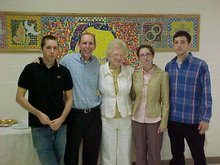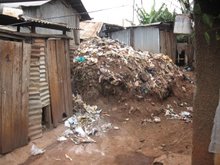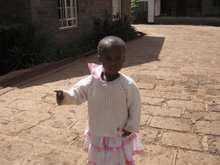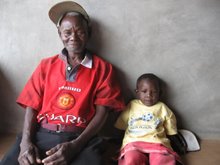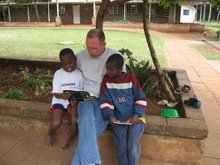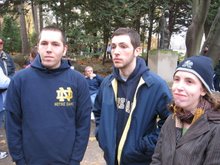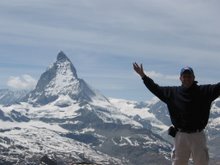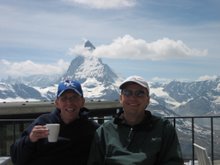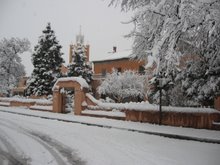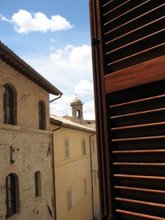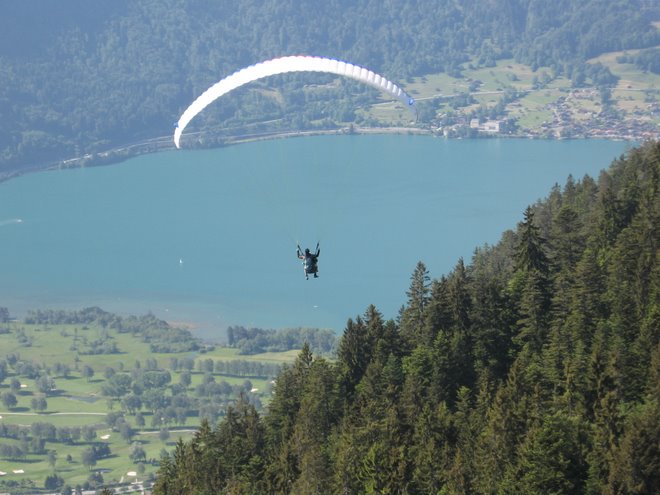 Smokey bed in Masai house. Click to enlarge photos.
Smokey bed in Masai house. Click to enlarge photos.
I had a great visit at the manyatta on Sunday. I had requested to stay at least one night in the traditional Masai house. The Masai pastor (of what church I have never known) picked me up by his motorbike and we made the 20 minute ride to the manyatta and home of my friend Fred. We got there in early evening - so after saying my hellos to his mother and dad (dad is about 85 years old and cannot see unless you are up very close) we walked to a distant manyatta to greet the children there and see some of the other houses. I had never been to that manyatta before. At dusk we went into the house that was newly constructed by Fred’s mother. She is one of four wives of Fred’s dad and has been living in Kajiado – the home of many of these Masai. She is an older woman, thin and tall yet so much stronger than me. You can tell her strength by what she accomplished in building this house of logs, limbs and cow dung. Some communities use mud and cow dung. This particular Masai group leaves out the mud. The house is typical size and layout. Fred says some houses, such as one he lived in, have as many as twelve inhabitants, though some of the children are “farmed out” to other houses with a smaller number. These “farmed out” children eat and sleep in the neighbors’ or relative’s house as if they were a member. This particular house is new and not yet fully finished so it has only Fred, his mom and another girl. There are basically three rooms. The center area, with three stones forming a fire pit in the middle and there are always two “bedrooms” or shelves built into the walls on either side of the cooking area. One bedroom is for the mother and the other for the children (in this case, me and Fred.) Fred’s dad’s other wives have houses next door. All the women raise the children communally. Fred has many stepbrothers and sisters varying in age. As near as we can tell, Fred was conceived when his father was 67 and he has other children younger than Fred. As you may know, the Masai women are almost always pregnant each and every year.
So . . . once darkness fell, we went into the house and tea was prepared. We ate some of the bread and margarine I brought with me, as well as some bananas and a few oranges I put in my bag. Last time I drank water from this manyatta and ate their food I got Typhoid. Fred understood and knew I would bring some food for us to share. I also brought my mosquito net but we didn’t use it. We had visitors all through the evening. Many of the children came by to greet me as did many of the women. They didn’t stay long, just long enough to say welcome me and then they moved on. Jackson, a young friend of Fred’s stayed a little bit to listen to the iPod I brought. They sang so loud it was hysterical. There were some Lucky Dube (reggae) songs they recognized. At about 9pm Fred said it was time to sleep. The rain had begun to fall and there was a pleasant breeze coming through the little 6 inch hole in the wall. This was the only ventilation in the house that is used for cooking on an open wood fire. The smoke was almost unbearable but I got used to it and eventually stopped crying. But even Fred teared up at the smoke too. We laid on the bed/shelf and talked like a boy scout campout. We talked about culture, tradition, his parents. I used a Masai blanket I had from my house and we tried to fall asleep. It was no use. The rain pounded the roof so hard that we laughed all night. You couldn’t hear the other talk. Later that evening we heard hyenas very close and the dogs barked at them all night long. At about three we snuck out of the house for a “short call” or bathroom break. In the pouring rain, dogs barking, mud everywhere, peeing with the wind. You had to laugh. I didn’t sleep much that night but it was one of the best nights I have had in Kenya. We woke at daybreak but lay in the bed for hours since there was nothing to do in this torrential rainfall. At one time, men came yelling for us to come help lift a cow that was stuck in the mud and wouldn’t wake up. All of the cows were taken to the abandoned chicken warehouse when the rains began because they knew they were too weak to stand the mud and would die in the cold and wet. This particular cow could not be moved last night so they covered it with a piece of plastic and waited until morning to try to get it to stand. It took four tries throughout the day but it finally got its strength and was able to stand on four legs.
I’ve never seen it rain so long and hard in Kenya. It was a blessing (Many felt that I brought the blessing with my visit.) Fred’s mother gave me the flywhisk she had completed. It is a tail from a wildebeest with a beaded handle for swatting away flies. It is beautiful. I asked Fred if I could give her something for her work. He said the tradition is sometimes a grateful person gives a kilo of sugar as appreciation. That is about 100 shillings or $1.30 I love this place.
When we thought it would never stop raining, we decided I would probably stay another night since the dirt roads were impassible. We walked to a nearby little town for chapatti and some bread for me. Later, it did stop raining and the roads, although treacherous, were passable and I went home as scheduled Monday afternoon. On the way home from the store we passed a man obviously limping and in pain. He had been cutting grass for the cattle and cut his big toe badly with a scythe and was walking in a plastic flip-flop filled with blood. But he was a Masai and would show no emotion.
I can share more and talk about the goodness of the people, or the laugh the women got when I came home covered with mud from falling in the water. I told them we met up with a lion. I also met a man who said he was my age. He said he was fifty-nine. He looked seventy! But he was, I am told, the last of that manyatta to have had the experience of killing lions. He killed three in his youth. Fred’s father has a chunk taken from his side from a lion. There are still many lions in Kajiado, their ancestral home. But, I’ll share other stories later. But know it was a great night, a great time. I want to go back and have been invited to live there. Not sure about that but it is tempting and I know I could do it except for the food I would need to eat and the water I would need to drink. How happy am I!
So . . . once darkness fell, we went into the house and tea was prepared. We ate some of the bread and margarine I brought with me, as well as some bananas and a few oranges I put in my bag. Last time I drank water from this manyatta and ate their food I got Typhoid. Fred understood and knew I would bring some food for us to share. I also brought my mosquito net but we didn’t use it. We had visitors all through the evening. Many of the children came by to greet me as did many of the women. They didn’t stay long, just long enough to say welcome me and then they moved on. Jackson, a young friend of Fred’s stayed a little bit to listen to the iPod I brought. They sang so loud it was hysterical. There were some Lucky Dube (reggae) songs they recognized. At about 9pm Fred said it was time to sleep. The rain had begun to fall and there was a pleasant breeze coming through the little 6 inch hole in the wall. This was the only ventilation in the house that is used for cooking on an open wood fire. The smoke was almost unbearable but I got used to it and eventually stopped crying. But even Fred teared up at the smoke too. We laid on the bed/shelf and talked like a boy scout campout. We talked about culture, tradition, his parents. I used a Masai blanket I had from my house and we tried to fall asleep. It was no use. The rain pounded the roof so hard that we laughed all night. You couldn’t hear the other talk. Later that evening we heard hyenas very close and the dogs barked at them all night long. At about three we snuck out of the house for a “short call” or bathroom break. In the pouring rain, dogs barking, mud everywhere, peeing with the wind. You had to laugh. I didn’t sleep much that night but it was one of the best nights I have had in Kenya. We woke at daybreak but lay in the bed for hours since there was nothing to do in this torrential rainfall. At one time, men came yelling for us to come help lift a cow that was stuck in the mud and wouldn’t wake up. All of the cows were taken to the abandoned chicken warehouse when the rains began because they knew they were too weak to stand the mud and would die in the cold and wet. This particular cow could not be moved last night so they covered it with a piece of plastic and waited until morning to try to get it to stand. It took four tries throughout the day but it finally got its strength and was able to stand on four legs.
I’ve never seen it rain so long and hard in Kenya. It was a blessing (Many felt that I brought the blessing with my visit.) Fred’s mother gave me the flywhisk she had completed. It is a tail from a wildebeest with a beaded handle for swatting away flies. It is beautiful. I asked Fred if I could give her something for her work. He said the tradition is sometimes a grateful person gives a kilo of sugar as appreciation. That is about 100 shillings or $1.30 I love this place.
When we thought it would never stop raining, we decided I would probably stay another night since the dirt roads were impassible. We walked to a nearby little town for chapatti and some bread for me. Later, it did stop raining and the roads, although treacherous, were passable and I went home as scheduled Monday afternoon. On the way home from the store we passed a man obviously limping and in pain. He had been cutting grass for the cattle and cut his big toe badly with a scythe and was walking in a plastic flip-flop filled with blood. But he was a Masai and would show no emotion.
I can share more and talk about the goodness of the people, or the laugh the women got when I came home covered with mud from falling in the water. I told them we met up with a lion. I also met a man who said he was my age. He said he was fifty-nine. He looked seventy! But he was, I am told, the last of that manyatta to have had the experience of killing lions. He killed three in his youth. Fred’s father has a chunk taken from his side from a lion. There are still many lions in Kajiado, their ancestral home. But, I’ll share other stories later. But know it was a great night, a great time. I want to go back and have been invited to live there. Not sure about that but it is tempting and I know I could do it except for the food I would need to eat and the water I would need to drink. How happy am I!

